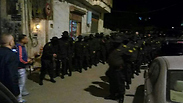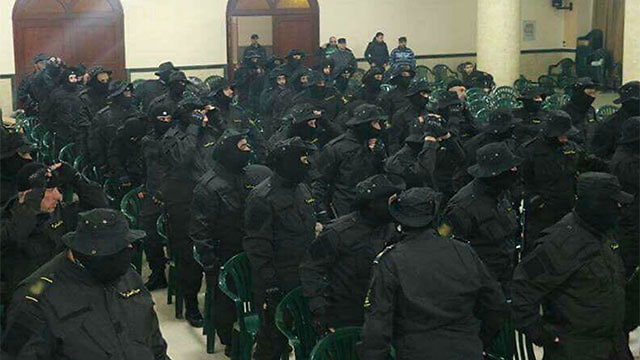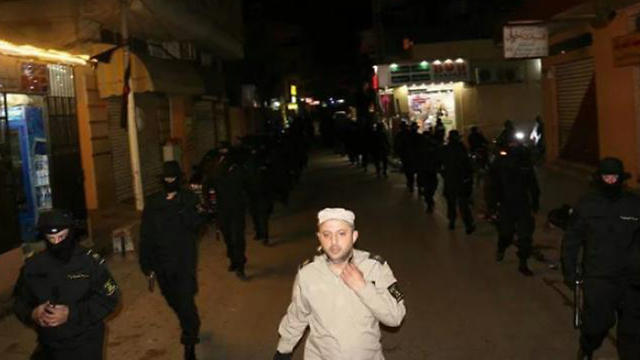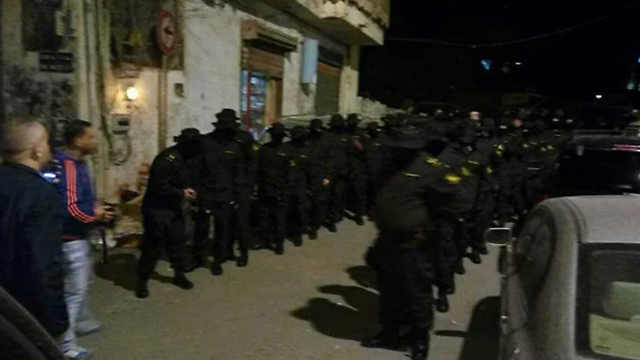

State within a state: Hezbollah policemen in the streets
A storm in Lebanon: Dozens of masked Hezbollah men are documented in nighttime operation to arrest drug dealers in Beirut; Opponents of the organization: This is what a country that has given up its authority in favor of the "tiny state" looks like'; Hezbollah: Photos are of 'the young supporters of the organization,' who were told to stop.
A set of unusual pictures came out on the tailend end of last week from the southern suburb of Beirut, which is in effect a Hezbollah stronghold. The photographs show men wearing black during a raid in the Palestinian refugee camp Bourj el-Barajneh. Those who published these photos on social media claimed the men were members of the Shi'ite terror organization who had set out to catch drug dealers and drug users, in addition to other lawbreakers.
The force apparently included dozens of Hezbollah members and was presented as the organization's "social security department." Up until the end of last week, the members of this force had not been seen. The images of the men caused an uproar by Hezbollah opponents, who saw them as another sign that the Lebanese state was losing its ability to rule over Hezbollah.
"This is what a country that has given up its authority in favor of the 'tiny state' looks like," said Ashraf Rifi, Lebanon's former justice minister and one of the most vocal opponents of Hassan Nasrallah's Hezbollah organization. Rifi said that the pictures testify for the umpteenth time how the very existence of Hezbollah goes against the state and its institutions.
Chairman of the Phalange Party in Lebanon, Sami Gemayel, also joined the criticism by saying that Lebanon is behaving as if it has seen nothing to spare itself a headache. Coordinator of the March 14 Alliance General Secretariat Fars Said similarly criticized Lebanese President Michel Aoun, who is an ally of Nasrallah: "The words of the Lebanese president, who supports Hezbollah's weapons, have made his display of strength in the southern suburb of Beirut become routine news, as if we were talking about the state of the movement."
Arab media outlets opposed to Hezbollah emphasized the irony of having Hezbollah launch a war on drugs, when the organization itself is accused of using drug trafficking as a central source of income. Nasrallah has rejected these claims in the past. In the Saudi daily Al-Sharq Al-Awsat, known as a newspaper that routinely gives Hezbollah negative coverage, it is reported that Lebanese officials are unhappy with the pictures published and that Interior Minister Nu'ad al-Machnouk is expected to issue a statement of condemnation. In recent weeks it has been reported that Lebanese security forces have carried out similar raids, and military sources told the Lebanese Daily Star that arrests and raids have also taken place in the areas of the Lebanon Valley and the southern suburb of Beirut, which is controlled by Hezbollah.
The Lebanese newspaper An-Nahar asked Hezbollah's information bureau if the organization believes it has the right, regardless of how powerful it has become, to take the country's place on its missions. Hezbollah responded by saying that "The pictures that were distributed belong to the young supporters of the organization, who were eager to help the security forces and carried out this activity without coordination with Hezbollah. Hezbollah has contacted them to have them desist, and the matter is now resolved." Sources in Hezbollah told the Lebanese channel MTV that the struggle against drugs is within the jurisdiction of the state and not under Hezbollah's authority.
The photos surfaced during a time of renewed public debate in Lebanon on the matter of Hezbollah's weapons: The issue has returned to the headlines, as two former Lebanese presidents and three former prime ministers sent a letter to the Arab League summit, criticizing the fact that Hezbollah holds its weapons on Lebanese soil. The "letter of the formers," which caused a storm in the country, was sent while current Lebanese President Michel Aoun and Prime Minister Saad Hariri were present at the summit.
(Translated and edited by Gahl Becker)


















